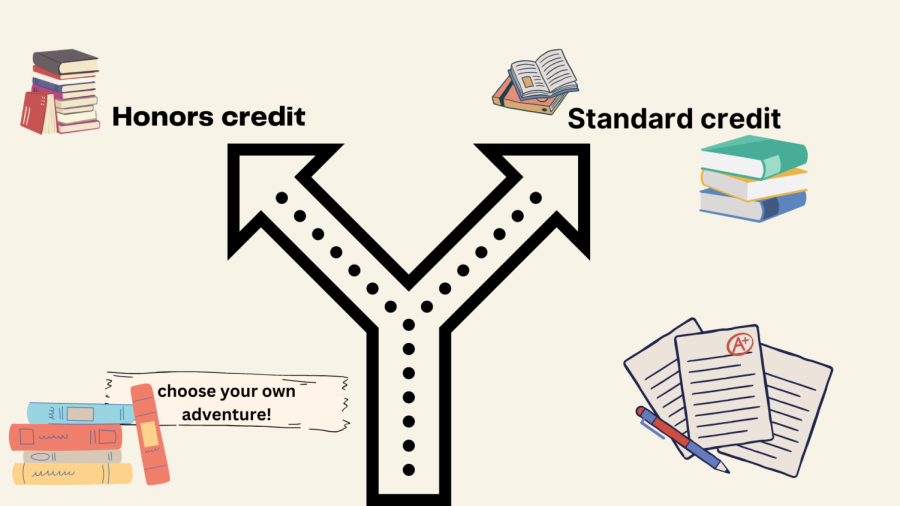Embedded English Honors creates a more equitable learning environment
Back in October 2020, we were in the middle of a COVID lockdown. With virtually no idea of when we could come back to school and no concept of where everyone was after countless months of E-learning, the English department was finally able to bring a program they’d been thinking about for years to life: English Embedded Honors. This idea, for many years in the making, would go on to make the English curriculum more accessible and equitable for all.
This model would not come without doubts: How could so many different students of so many different abilities be able to learn in the same class with the same curriculum? This became a question for not only parents in the community but also students, who felt as if their education would be dampened without this immediate honors credit. As a student who also cares a lot about the honors program and honors GPA weight, I too, was initially skeptical about this new approach. However, after experiencing this new curriculum for the past two years,, I’m surprised we haven’t seen these changes district-wide sooner.
So what is embedded English honors? In Fall 2021, D219 integrated a new honors system for the freshman class of 2025 after realizing students were at very different places with everyone having their eighth-grade year online. Instead of there being a standard and honors English course, there would now be one standardized Freshman English level, weighted at a standard 4.0 GPA. Then, in the second semester, any student could opt into honors English. The class would remain the same and everyone would learn the same content, regardless of what credit they were taking, but honors students would do more challenging work with the content. This past school year, the English Embedded Honors program was expanded to include sophomores.
The intention of English Embedded Honors is to make sure every student has the same exposure to the English curriculum. Being exposed to this rigor of work could eventually give any student the strength and knowledge to take more advanced classes in the future. The end goal, English department director Sara Klos says, is for as many students as possible to take AP English Language and Composition (AKA AP Lang or Great American Writers), a college-level course, in Junior year.
“[AP Lang is] the most usable English class. It’s kind of your entry-level English class. Everyone takes it in college even if [they’re] not an English major. You have to take an English credit,” Klos said. “So if we can get kids through that credit, that’s a huge weight off their shoulders, not having to worry about taking that [class] or paying for another class when they get to college.”
One historical barrier for students taking honors and AP-level English classes has been the PSAT, which eighth graders take before high school. According to US News, tracking is a system that places students in different level classes based on their previous perceived abilities. A PSAT or placement test score decides what classes you take in high school, and to a further extent, where you go to college. Not only do these means for class selection hold people back from reaching their full potential, they can be biased by race.
“The impetus for all of [these changes], besides all the research that’s been done and how de-tracking classes helps create a more equitable [environment] and access to more opportunities for all, is we were hearing from students consistently, specifically our Black and Latinx students, that they felt like they were being held back from the same AP/honors opportunities that their peers were getting…” Klos said. “They would say ‘I was the only Black kid in my class,’ and it’s like where is everyone else? Why isn’t everybody else here too?”
By implementing an embedded system, anyone would have the opportunity to take an honors credit, regardless of test scores.
“[Embedded honors] takes away any of those fake things we’ve created for years that place kids into honors,” Klos said. “One test score, as we know, shouldn’t dictate where someone ends up. And even teacher placement, kind of institutional bias and things like that maybe have kept people separate… One of our big points for doing this was, essentially, we’re creating segregated classrooms by keeping the tracks.”
Not only is this system more inclusive and equitable, but it frees up more time in the curriculum. Freshman English teacher Ashley Amelianovich, who played a role in advocating for the embedded honors curriculum, said she adds more time into her schedule for students to read independently.
“The biggest concession I’ve made is [giving] a little more time to read in class,” Amelianovich said. “I decided for many reasons but the switch [to] embedded honors was a good time for me to bring in more independent reading, just trying to foster a love and joy of reading because otherwise we’re never going to get better at reading if we don’t just read… But because I went to providing more time to read and work in class and protect providing more time to read independently in class, I cut out a full curriculum book. I’m not sad about it.”
I’ve felt as if the removal of the separation of the honors and standard classes has taken a lot of weight off my shoulders. I’m still challenged with the amount of work I’m required to do and the furthering of concepts and themes, but we have more time to enjoy other activities, such as independent reading. And as a reader and writer, I find more joy in that. Of course, this is my personal experience with my teachers. I acknowledge that every teacher is different and assigns work and spends time differently.
In the big picture, the most important part of English class is the real-world applications. We learn so much through reading and dissecting themes of literature over the past couple of centuries. We learn about our history’s rights and wrongs, different philosophies of people around the world and arguably most important, about ourselves. The access to this knowledge and these conversations, should not be limited based on a test score.
This is not to say that there aren’t flaws within the way the English Embedded Honors system is currently presented. Even with its emphasis on inclusivity, the idea that students feel like something is “being taken away” from them still persists, not feeling like their hard work is acknowledged. Additionally, another concern is that conversations become too dry when combining classes. The reasons for this could vary: I think a lot of students feel like they don’t get anything out of a class because it’s not specified as an honors class with other honors students. Or maybe other students are too scared to speak up because other students dominate the conversations. Niles North’s SOAR (Student Organized Against Racism) hosted an equity in education panel last month. Sophomore SOAR member Anh Nguyen expressed her thoughts on the reason why these classes might be quieter.
“[Some students] think it’s just going to be a regular class,” Nguyen said. “And I think that takes a lot of motivation out because if you feel that you are better than a specific place that you’re in, you feel unmotivated to do any work. Unmotivated to do your absolute best and unmotivated to really explore what’s happening in the class.”
This is a complicated problem to fix, but I don’t believe the best approach to this curriculum is skepticism, as much as it is openness to the opportunity to learn in a different environment with different people. Most students who are in AP and honors classes know that year-to-year you will most likely see the same faces in these advanced classes. By combining all levels, we can get to know each other better and understand each other’s experiences. I believe if teachers and students decide on classroom norms to be fearless in our conversations and establish a warm and safe environment for learning to take place, that our classrooms will be stronger.
“I’m not saying there aren’t some struggles,” Amelianovich said. “But I think given enough time, we’ll figure it out, even while [us teachers are] struggling, kids are getting access to more knowledge and more content and more diversity of perspectives, which I think is valuable.”
Often an issue I encounter through this embedded system is that teachers are more concerned with the quantity of writing rather than quality, especially during timed essays. Time would be much better spent on the complexity of arguments through different prompts, especially for honors students. The prompts aren’t in depth enough. We can all have the same conversations in class together but have a more advanced prompt to challenge those in honors.
“I really like the way it works, though I do think that if I were to change one thing, and I don’t think it necessarily needs changing,” freshman Eleanor LeMaistre said. “I think it might be interesting to have the standard students and honors students have different prompts every once in a while.”
The English department was the first to implement embedded honors and definitely not the last. In the next couple of years, the rest of the English department will be de-tracked. There are also pilot Embedded Honors History classes in the works, with the hope to combine the Junior year history classes next year. Outside of humanities, who knows? Math and science could be next.
Learning is like a prescription– everyone needs a different dose. It’s not an easy feat to get over, there’s still much that can be improved. But for the future of an equitable classroom, it’s worth it. A mighty journey is still up ahead for Niles North’s de-tracking epic.

Penelope is a senior, and this is her fourth year on North Star News. She's inspired by journalist icons like Carrie Bradshaw and Andie Anderson....








Krista Verdun • Apr 29, 2024 at 9:24 pm
As an English teacher, I found the description of the embedded honors program very thorough. I like that you provided both viewpoints on it and it challenges me as a teacher to try to find new ways to make discussions and assignments more inclusive, while still giving all learners an opportunity to stretch their skills and understanding.
Cynthia Fey • Apr 20, 2023 at 1:41 pm
Thanks, Penelope. Great reportage of the issues.